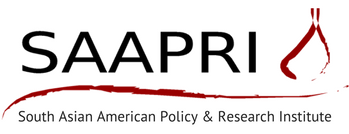SAAPRI is committed to supporting immigrants in the United States, who like many of ourselves, our parents, and our neighbors, have helped build the fabric of this country. In recent days, the Trump administration has issued a series of directives that present legal and humanitarian concerns, ultimately hurting everyday immigrants and international students (Update: the policy that would have forced international students to leave the country if their colleges hold classes online this fall was rescinded July 15th, 2020) and making our communities less stable, less diverse, and less safe.
H-1B visas for speciality workers and their families, which are common in the desi community, continue to be banned through the end of 2020. H-2B visas for nonagricultural seasonal workers, J-1 visas for cultural exchanges and student internships, and L-1 visas have also been banned. This harms not only those who have worked for years to come here legally but also their family members. Everyday immigrants now face difficult decisions as family members lose visas, and they must decide whether to continue working and be apart or be together but leave this country. It is a common misconception that immigrants ‘take jobs’ from Americans. This is not the case, as visas are strictly regulated and in fact immigrants contribute to diversifying the economy and creating new jobs for non-immigrants as well.
International students in America already face many challenges, like navigating the admissions processes in their home countries and in the U.S., including testing systems and class credit transfers and limited employment and internship opportunities compared to their domestic peers. They also do not benefit from the same levels and types of financial aid available to domestic students and therefore undertake significant personal expense to travel and study here. Additionally, the OPT visa system extends immigration to interns and workers who are in jobs directly related to their major, which further limits immigrant students’ ability to change their career plans or course of study. This requires them to plan their student and post-graduate lives in terms of visa deadlines and regulations instead of typical student interests.
The July 6th, 2020 announcement from Immigration and Customs Enforcement (ICE) and the Department of Homeland Security (DHS), which was rescinded July 15th, 2020 after legal intervention, sought to compound these challenges by targeting international students whose U.S. host school will only offer online instruction in the fall term. According to ICE’s own report, the Student and Exchange Visitor Program (SEVP) allowed over 1.5 million future world leaders to study at nearly 9,000 schools. In 2018, there were over 250,000 students of South Asian origin that were studying in the United States. South Asia provides a meaningful portion of the student body on American campuses. Had these new guidelines been implemented, they would have significantly disrupted the lives and futures of many of these students and families with very little time to adjust. Further, it would have harmed the schools who rely on these foreign students for revenue and enrichment of their own communities through diversity. We must continue to speak, share, comment, and act against such decisions.
Until the administration’s rule on foreign students was rescinded, international students including even those at the most selective universities faced deportation after working for years to get there if their university determined that the ongoing COVID-19 pandemic would make it unsafe to hold most classes in-person. This announcement hurt and added unnecessary stress on everyday students who do not deserve to have their dreams taken from them, especially in a country that was built on the ideals of freedom. The risk and trauma brought on by the order and sentiments like it remain. That is why we felt it was still necessary to write this letter.
Sincere gratitude is given to the American universities that came out in support of international students and academic ideals of freedom and knowledge. Harvard and MIT, together with over 180 other private and public institutions, had filed a lawsuit arguing that ICE’s new directive was not only a bad policy move but also illegal and would have left hundreds of thousands of lawful students with no educational opportunities. No university would have been untouched, and no community would have been immune to the economic, social, and cultural deficits that barring international students would have brought.
Universities were not alone in this fight. Many of the large multinational corporations who provide student internships, externships, OPT opportunities, and full-time employment were also taking action against ICE’s destructive policy. Led by the U.S. Chamber of Commerce, eighteen corporations, trade associations and lobbying groups recognized the significant harm the policy posed to an already stressed economic climate. Those organizations had filed their own amicus brief against DHS and ICE, seeking a temporary restraining order against the action.
Such attacks on legal immigration and the right to education are not only arbitrary and against the ideals of American freedom, but they have real consequences for everyday people and students who do not deserve to be faced with risking their dreams or deportation.
We stand for immigrants from all countries and creeds and will continue to fight for minority rights in this country. It is up to each of us to stand up in solidarity with all minority groups in America because policies and practices like those the administration and its agencies are promoting endanger and devalue all of us.
We encourage our readers, benefactors, supporters, and friends to continue to be engaged and reach out to their employers and colleagues and advocate on behalf of vulnerable immigrant groups whenever necessary through whatever means they see fit.
- Read more about our statement in the India Post here
